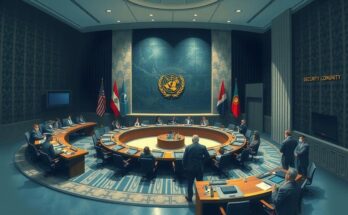Marco Rubio’s role as Secretary of State faces scrutiny as his previous opposition to authoritarian regimes clashes with Trump’s foreign policy towards Russia and Cuba. Recent developments, such as Russian oil shipments to Cuba and negotiations with Maduro, challenge his commitment to democracy. The administration’s disorganization complicates Rubio’s ability to maintain his principles in foreign affairs, particularly regarding U.S. alignments in Latin America.
Marco Rubio’s long-standing opposition to authoritarian leaders is being challenged by Donald Trump’s foreign policy on Russia and Cuba. As Secretary of State, Rubio has highlighted the potential for collaboration with Vladimir Putin’s Russia if a peace agreement ends the conflict in Ukraine. This occurs concurrently with significant Russian oil shipments to Cuba, supporting a regime that Rubio previously denounced as “an enemy of humanity.” This situation questions how Rubio will reconcile his historical stance against oppressive regimes with the actions and rhetoric of the current administration.
In his first month as Secretary of State, Rubio has engaged in high-profile negotiations surrounding various conflicts while navigating the discord within the Trump administration’s foreign policy. His recent efforts to engage with Russia contrast starkly with his previous commitment to supporting Ukraine through sanctions against Moscow and labeling Putin as a “war criminal”. Such divergence from his known beliefs raises concerns about his alignment with the administration’s approach to global authoritarianism.
A former U.S. diplomat remarked that Rubio is in a challenging position, stating, “He is in a very difficult position because his long-held beliefs are not the ones he has been tasked to defend now.” The diplomat characterized Trump’s rhetoric against Ukraine and its president as “shameful,” reinforcing the notion that Rubio may face complications in denouncing authoritarian leaders due to the administration’s inconsistent messaging.
The Trump administration’s lack of coordination in foreign policy, particularly regarding Venezuela, places Rubio in a difficult spot. Recently, a special envoy was sent to negotiate with Nicolas Maduro’s regime, contradicting Rubio’s advocacy for the Venezuelan opposition. As he prepares for his first trip as Secretary of State to Latin America, conflicting messages from the White House risk alienating key voter blocs in South Florida, notably among Venezuelan exiles who had previously supported Trump.
Moreover, Rubio now finds himself defending the foreign-aid freeze that undermines humanitarian assistance to Cuban, Venezuelan, and Nicaraguan exiles. Critics within the administration have highlighted concerns over the status of democracy promotion in U.S. foreign policy, suggesting that Trump’s approach may not align with Rubio’s principles. As a result, Rubio’s existing relationships with key Latin American leaders and his legacy in promoting democracy face uncertainties, drawing attention to potentially harmful implications for the region.
The tumultuous dynamic between the Trump administration and its foreign policy, particularly surrounding Venezuela and Cuba, indicates a disjointed approach. Former officials express discontent with the disorganization, hoping for Rubio’s ability to effectively manage international relations. However, as tensions continue, critics remain skeptical about whether the administration can successfully align its policies with democratic values and the principles that Rubio has championed throughout his career.
In summary, Marco Rubio’s ascent as Secretary of State introduces significant challenges, particularly regarding relationships with authoritarian regimes in Russia and Cuba. His historical opposition to such leaders seems increasingly difficult to uphold under the current administration. As he navigates a complex foreign policy landscape, questions arise regarding the coherence of Trump’s approach and its implications for democracy promotion in Latin America and beyond.
Original Source: www.miamiherald.com




